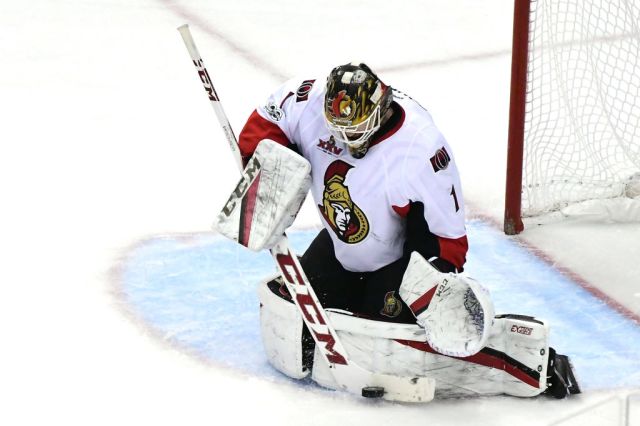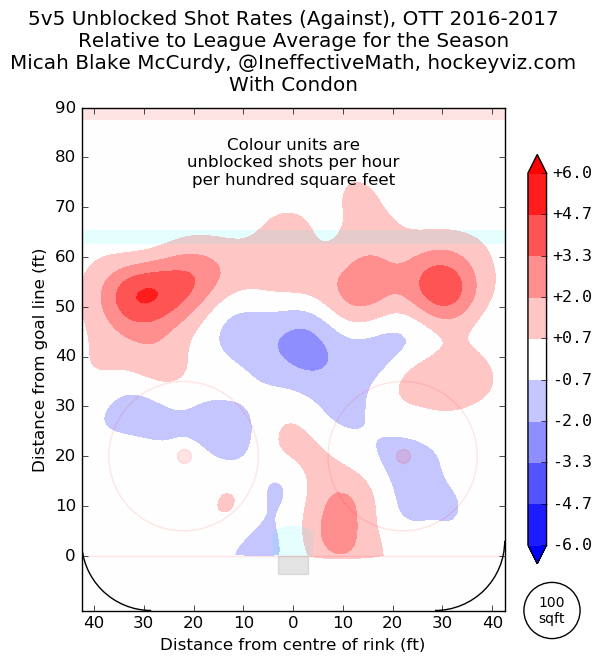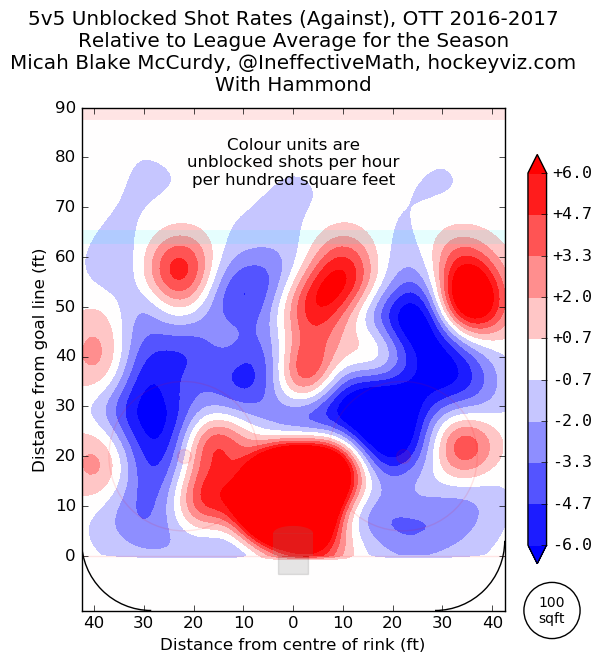
If you’re a journeyman goaltender who can help back the Ottawa Senators to a playoff appearance and are headed towards unrestricted free agency, have I got good news for you.
For the second time in two years, the Senators have inked their backup goaltender to a three-year extension.
Today the Senators announced that they have signed Mike Condon to a three-year extension worth $7.2-million ($2.4-million average annual value). Condon will be paid $1.7-million in the first year of his deal, $2.5-million in the second and a cool $3.0-million in the third.
I guess all those talks about being comfortable bringing Andrew Hammond back as the backup were for naught.
Not a bad payday for a 27-year old goaltender who only has two-years of NHL experience under his belt and was exposed on waivers as recently as last October.
The lore of how Condon wound up in Ottawa is pretty well known. For those unfamiliar, the goaltender was claimed from the Canadiens by the Penguins on October 11th and was eventually dealt to the Senators for a fifth-round pick when it was learned that Craig Anderson would spend significant time away from the club so that he could spend time with his family as his wife Nicholle was diagnosed with cancer.
In Anderson’s absence, Condon played and played often.
In 40 appearances, he started 38 games for the Senators compiling a 19-14-6 record, five shutouts, a 2.50 goals against average and a .914 save percentage.
He built a reputation on the fact that he not only brandished a retro Ron Tugnutt mask, but in his first eight appearances, he posted two shutouts, a 1.68 goals against average and a .945 save percentage.
Beyond those first eight appearances however, Condon’s numbers were sub-replacement level. In his next 33 appearances, Condon posted a 15-13-5 record, a 2.64 goals against average and a .908 save percentage.
Early on, he was fantastic and as the Senators flirted with a playoff spot for most of the season, Condon earned praise for saving the Senators’ season.
It’s an interesting claim considering Condon’s save percentage fell below the league average (.915 in 2016-17 according to Quanthockey). Strictly from a team-building standpoint, the debate Pierre Dorion and his staff had to have is whether a league average goalie could have had the same effect or helped the Senators win a similar number of games over the same stretch of time. (If the answer is yes, then maybe the Senators shouldn’t be as committed to this player as much as they obviously are.)
An obvious counterargument to the questions about Condon’s performance is that the Senators overused him and fatigue became a factor. I believe during one stretch of the season, Condon played in 24 consecutive games, but there’s also something to be said about how from an on-ice perspective, Condon was also relatively sheltered in terms of the shot quality that he faced.
The following graphic is via HockeyViz.com:
Just to put things in perspective, here is a visual of the shot rates that Andrew Hammond experienced last season.
If there’s a significant concern, it lies in the idea that the Senators are investing in a goaltender because of the narrative (helping the team reach the postseason). The underlying numbers leave something to be desired and judging by the on-ice results, Condon was sheltered in terms of the shot quality that he faced.
For a small market team to not only invest term, but pretty significant dollars to a goaltender during a window wherein the team needs to win is pretty significant. The Senators can ill afford to waste dollars on a position where a replacement level goaltender is available each and every summer and would cost half or one-third the salary.
In a vacuum, this isn’t a crippling contract, but when it’s held up with the other deals that the Senators have made lately for its depth players, this very well could be another instance where the Senators have overpaid for depth that they are familiar with. For a small market team that lives on the margins and needs to allocate its money efficiently, this money could have been better allocated to fill a more important hole on the roster.
The Senators do have a tendency to keep known commodities in the fold rather than look for external solutions. It helps that their goaltending coach, Pierre Groulx, campaigned for the organization to trade for Condon in the fall and perhaps most importantly, it’s pretty easy for an organization to simply reward a player that they are comfortable with and had success with.
I just can’t imagine what the consequences would be if the team balked at signing a backup to a three-year deal simply because he helped them reach the postseason.
“Oh hey, Andrew Hammond. I didn’t see you standing over there.”
Having lost a top-four defenceman through the expansion process without netting any assets in return, Senators became a little testy following Marc Methot’s departure.
I don’t know if it was genuine interest, due diligence or buckling to the pressures of public scrutiny, but the Senators reportedly circled back on Methot to see if there was a realistic chance in reacquiring his rights from Vegas.
Whether that’s enough to placate this fan base remains to be seen, but the Methot departure created a void on the roster and there is some uncertainty as to who will his role.
Internal candidates for promotion include Dion Phaneuf and Fredrik Claesson, but thanks to the expansion claim on Methot, the Senators save $4.9-million which they can reallocate on their roster. Obviously with new contracts needed for Ryan Dzingel and Jean-Gabriel Pageau, this money can help cover the cost of their raises, but with the savings here and hopefully with some willingness from ownership to reinvest some of Vegas’ $17-million in expansion fees and the revenues from the team’s nine playoff home gates back into the roster, the Senators may explore the market for external options.
Well, if news that the Senators had re-signed Max McCormick or Tom Pyatt wasn’t going to get fans excited, I don’t think Emelin will do much to inspire either.
Emelin is 31-years old and he’s a left-shooting defenceman who’s in the last year of his four-year contract that carries an average annual value of $4.1-million, but actually costs $4.4-million in real salary.
The veteran defenceman has failed to post the kind of offensive numbers that he put up in the KHL, but over the past few years, he’s established himself as the prototypical defensive defenceman. The surface numbers are terrible and the underlying numbers leave something to be desired, but general managers love him because his willingness to throw his body around and deliver hard checks.
At his age, cost and general ineffectiveness, I don’t know why Pierre Dorion would kick tires on Emelin or even consider trading an asset to acquire him from Vegas. Maybe it’s due diligence or maybe it’s some bizarre contingency plan in the event that free agency, the trade market or the Senators alumni association can’t provide a better option.
Karlsson Contract Foreshadowing?
Speaking of contract extensions, Connor McDavid is reportedly close to signing an eight-year extension worth an average annual value of approximately $13.25-million.
McDavid’s probably the best player in the league and although he’s young and in the last year of his entry-level contract, the circumstances surrounding his situation are admittedly different from Erik Karlsson’s.
With that being said however, it’s hard not to look at the money that the Oilers will pony up for McDavid and not wonder what it’s going to take for the Senators to keep Karlsson in the fold.
Karlsson will be 29-years old when his current seven-year deal with the Senators ends, but as a right-shot defenceman who happens to be the greatest offensive defenceman of his era, his ability and the position scarcity at the position he plays means that teams would be lining up to sign him as an unrestricted free agent.
Even though Karlsson’s skills would erode in his 30’s, thanks to his superb skating ability and hockey IQ, it’s fair to assume that he’ll play at an elite level for quite some time. He’s just one of the rare talents that you can expect to play at a high level for the foreseeable future.
Karlsson will have all the leverage in negotiations and inevitably, irrespective of what the Senators accomplish as a team, until his future is secure, the uncertainty over his next contract is going to linger over this team like a black cloud. (Similarly, the pressure on management to operate efficiently and build a good product around him so that he’s enticed to stay will be paramount.)
Between what McDavid’s receiving and what other talents have signed for lately, it’s easy to envision Karlsson getting $10 to $12-million annually on his next deal.
Interest in Phaneuf Waning
It was another big day for Senators information on Twitter.
The Senators plan on keeping Dion Phaneuf. Inquiries slowed after the Draft in Chicago and more so once Methot was traded to Dallas.
— Darren Dreger (@DarrenDreger) June 28, 2017
I don’t really follow Dreger’s logic to explain the lack of interest in Phaneuf now that Methot’s gone, but considering how poorly the trade talks and the request to have Dion waive his no-movement clause have played out in the public sphere, this smells like the Senators are walking this one back.
Unless Dallas was the primary suitor for Phaneuf, it just doesn’t make any sense otherwise.
There probably wasn’t even that much interest in Phaneuf to begin with. If anything, this alleged trade interest was leaked to the media in hopes that they would artificially stimulate a market that otherwise wouldn’t exist.
Other News and Notes:
According to Darren Dreger, the market for Chris Neil may be bigger than expected:
Considering the circumstances, I wonder why a team like Pittsburgh would make a move and trade assets for Ryan Reaves when all Chris Neil would have cost the Penguins is money.
Add The Sports Daily to your Google News Feed!

